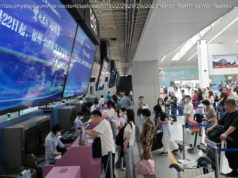The opportunities for growth are in Guangzhou, not Seattle.
Donald Trump’s assertion that he has China on the run is challenged one espresso shot at a time.
The president brags that a weakening in China’s currency, the yuan, and a slide in the country’s stock market are proof that he is winning the tariff war he’s waging against the second-biggest economy. China says it will tough things out.
The good news for China is the transformation of its economy –from reliance on exports and manufacturing to growth driven by consumer spending and technology. This shift is still little understood, if the public narrative in the U. S. is any guide. The caricature of sweatshop manufacturing and low-end assembly is woefully out of date. Just look at Starbucks Corp.
Starbucks is teaming up with Alibaba to deliver drinks and food in China. Last week’s announcement by the two companies is at least partly defensive, but it’s testimony to the strength of the domestic Chinese market that Starbucks expects it to surpass America. The pact also suggests that while Alibaba may be scaling back its footprint in the U. S. in response to Trump’s anti-China broadsides, co-founder Jack Ma has no problem getting into bed with American corporations. And vice versa: Trump isn’t scaring off U. S. companies from doubling down inside China. China isn’t going away, and its economic transition isn’t going to stop between now and the presidential elections of 2020 or 2024.
If China’s long-term future as an economic powerhouse was in any real jeopardy, Starbucks wouldn’t be doing this — Trump or no Trump. To be clear, the company’s press release doesn’t mention the president or tariffs or trade wars. Of course it doesn’t. No company wants to make itself a target at a rally or on Twitter. The numbers speak for themselves. The tie-up with Alibaba aims to encompass more than 2,000 Starbucks stores across 30 cities in China by the end of this year.
The world isn’t perfect for Starbucks and Alibaba’s Ele.me delivery operation. As my Bloomberg Opinion colleague Tim Culpan notes, both are taking competitive fire in China. The consumer coffee culture that Starbucks both fosters and epitomizes is too lucrative for rivals to pass up. Luckin Coffee is nipping at Starbucks’s heels while Ele.me is getting a run for its money from Tencent-backed Meituan-Dianping.
There’s turf to protect: It’s the turf of China’s modern economy, not the one that’s so dependent on exports that it will cave to U. S. pressure or collapse easily.
While the contours of its economy are changing, overall growth in China is simultaneously slowing. That’s as much a result of earlier steps to rein in debt as it is the impact of tariffs on shipments to the U. S. The challenge for China’s leadership is to juice the economy enough to prevent things slowing too dramatically without abandoning scrutiny of leverage. The government wants stability. Stability will, in turn, allow the consumption revolution to proceed.
It doesn’t look easy, but apparently Starbucks is betting on Beijing to achieve it.
To contact the author of this story: Daniel Moss at dmoss@bloomberg.net
To contact the editor responsible for this story: Philip Gray at philipgray@bloomberg.net






